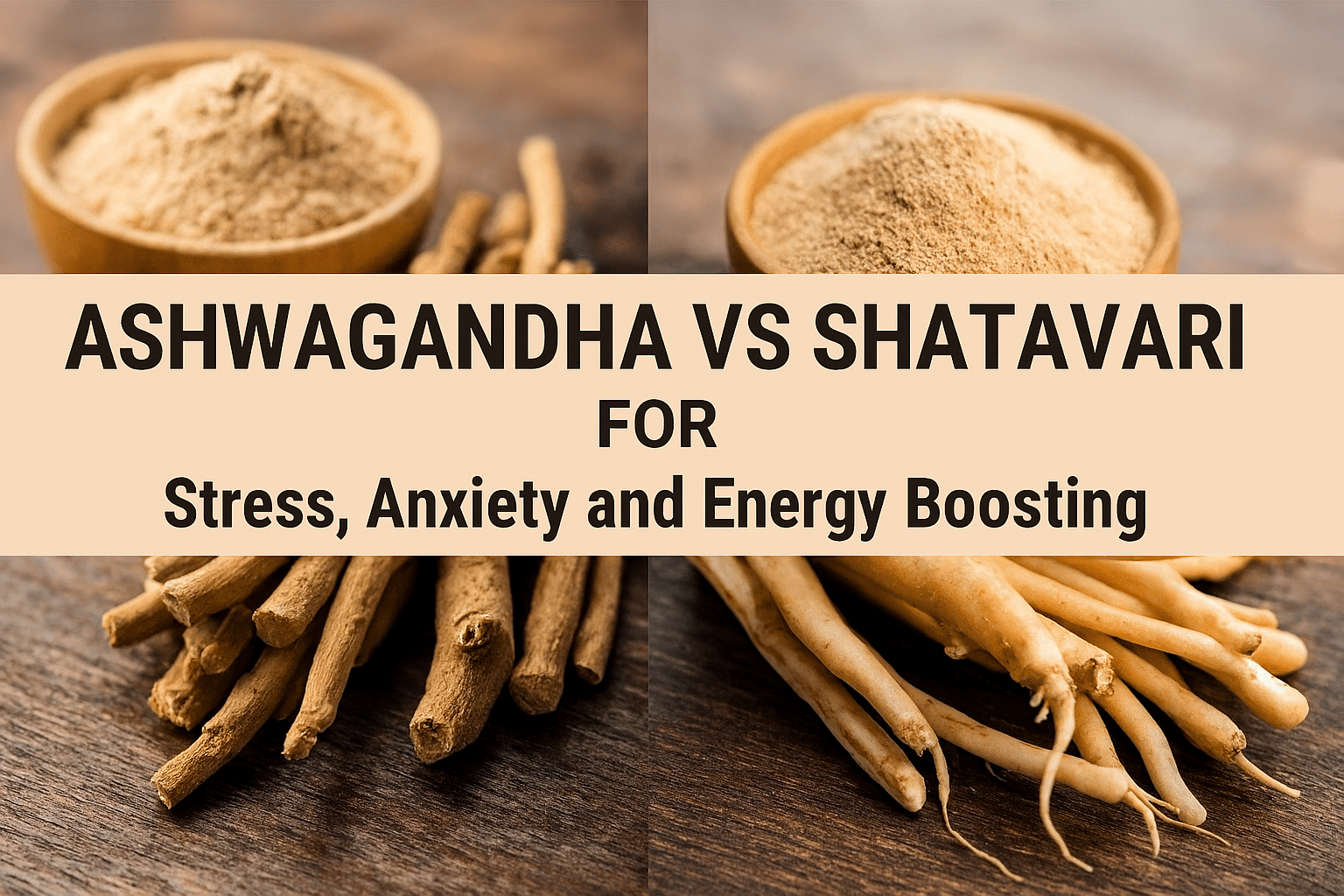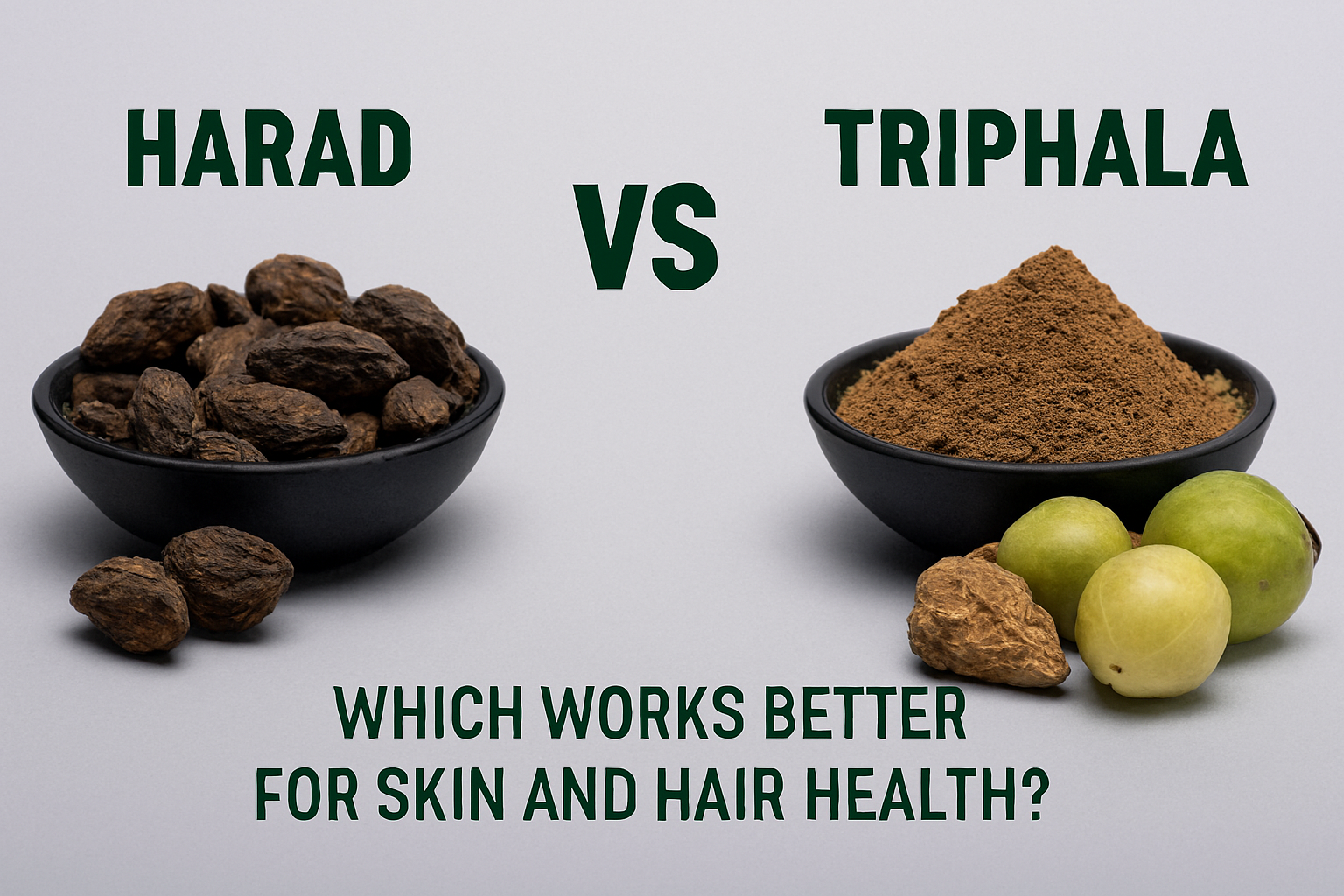🌿 Introduction
In today’s fast-paced world, stress, anxiety, and constant fatigue have become the “new normal.” From long work hours to digital overload, people are searching for safe, natural solutions to restore balance. Ayurveda, the 5,000-year-old Indian science of life, offers two powerful adaptogens that stand out: Ashwagandha and Shatavari.
But when it comes to stress relief, anxiety management, and energy boosting, many people ask: Ashwagandha vs Shatavari – which is better?
This blog will break down their unique benefits, common misconceptions, and practical ways you can use these herbs. By the end, you’ll know exactly how to choose the right adaptogen for your mind and body.
Understanding Ashwagandha and Shatavari
What is Ashwagandha?
Ashwagandha (Withania somnifera), often called the “Indian Ginseng,” is a powerful adaptogen. Traditionally used in Ayurveda, it helps the body adapt to stress, reduce cortisol levels, and improve overall vitality.
Key Benefits of Ashwagandha:
- Reduces stress and anxiety by regulating cortisol.
- Supports better sleep and relaxation.
- Boosts stamina, strength, and energy.
- Improves focus and cognitive function.
- Enhances male reproductive health.
What is Shatavari?
Shatavari (Asparagus racemosus) is considered the “Queen of Herbs” in Ayurveda, primarily used for women’s health but equally beneficial for stress relief and vitality.
Key Benefits of Shatavari:
- Balances hormones and supports women’s reproductive health.
- Acts as a natural cooling adaptogen to calm the nervous system.
- Enhances immunity and digestion.
- Reduces anxiety and emotional stress.
- Improves endurance and energy levels.
Adaptogens in Context
Both herbs are adaptogens, meaning they help your body “adapt” to physical, emotional, and mental stress. While Ashwagandha is warming and energizing, Shatavari is cooling and nurturing—making them complementary rather than competing herbs.
Common Challenges & Misconceptions
- “Ashwagandha and Shatavari are the same.”
❌ False. They differ in properties: Ashwagandha is stimulating, Shatavari is calming. - Overuse without guidance.
Taking high doses without proper consultation can cause digestive issues, hormonal imbalances, or unwanted side effects. - Gender-specific myths.
Many believe Ashwagandha is only for men and Shatavari only for women. While they do have gender-specific strengths, both can be used by men and women for stress and energy. - Quick-fix mindset.
Adaptogens take time to work. Expect gradual, sustainable improvements rather than overnight miracles.
Solutions & Best Practices
How to Choose Between Ashwagandha vs Shatavari for Stress & Energy
- Ashwagandha is better if:
- You struggle with high stress, anxiety, or overthinking.
- You need more physical stamina and mental focus.
- You face low energy or adrenal fatigue.
- You’re dealing with sleep problems or mild depression.
- Shatavari is better if:
- You want emotional balance and calmness.
- You experience stress linked to hormonal imbalance (PMS, menopause, mood swings).
- You prefer a cooling, soothing adaptogen for nervous tension.
- You want improved digestion and endurance.
Best Practices for Using Ashwagandha & Shatavari
- Dosage: Typically 300–500 mg/day of standardized extract. Always consult an Ayurvedic practitioner before starting.
- Forms: Available as powder, capsules, teas, or liquid extracts.
- Timing:
- Ashwagandha → evening or bedtime (for relaxation).
- Shatavari → morning or mid-day (for energy and balance).
- Combination: Some Ayurvedic formulations blend both for holistic benefits—balancing masculine and feminine energies.
Advanced Insights & Future Outlook
- Scientific Backing: Modern research shows Ashwagandha reduces cortisol by up to 30% in stressed adults, while Shatavari has shown positive effects on hormonal balance and stress reduction.
- Personalized Ayurveda: With AI-driven health apps and DNA-based Ayurveda coming up, choosing between Ashwagandha vs Shatavari may soon be customized to your body type and stress patterns.
- Global Demand: As adaptogens grow popular in the West, the market for natural remedies for stress and anxiety is expected to cross USD 23 billion by 2030.
Practical Case Example
Case Study:
Neha, a 34-year-old professional, faced work stress and anxiety. After consulting an Ayurvedic doctor:
- She took Ashwagandha at night to improve sleep and reduce anxiety.
- Added Shatavari in the morning to balance mood swings during PMS.
Within 2 months, she reported better sleep, reduced stress, and improved energy levels.
✅ Conclusion
When it comes to Ashwagandha vs Shatavari for stress, anxiety, and energy boosting, there is no one-size-fits-all answer.
- Ashwagandha works best for stress-induced fatigue, anxiety, and low energy.
- Shatavari shines for calming emotional stress, balancing hormones, and long-term vitality.
👉 The smartest approach? Consult an Ayurvedic practitioner and consider using them together for a balanced mind, body, and energy system.
🌟 Takeaway: Adaptogens don’t just fight stress—they teach your body to thrive.
❓ FAQs
1. Which is better for stress relief – Ashwagandha or Shatavari?
Ashwagandha is better for acute stress and anxiety, while Shatavari works well for emotional stress and hormonal balance.
2. Can men take Shatavari for stress?
Yes. Though often recommended for women, Shatavari also helps men with stress, digestion, and immunity.
3. Is it safe to take Ashwagandha and Shatavari together?
Yes, many Ayurvedic formulations combine both for holistic stress relief and balanced energy.
4. How long does it take to see results from these adaptogens?
Most people notice improvements within 4–8 weeks of consistent use, depending on diet and lifestyle.
5. Which is better for boosting energy?
Ashwagandha acts as a natural energy booster for stamina and focus, while Shatavari improves endurance and long-term vitality.
6. Can Ashwagandha help with anxiety and depression?
Yes. Clinical studies show Ashwagandha reduces cortisol and promotes relaxation, making it effective for mild anxiety and depression.




